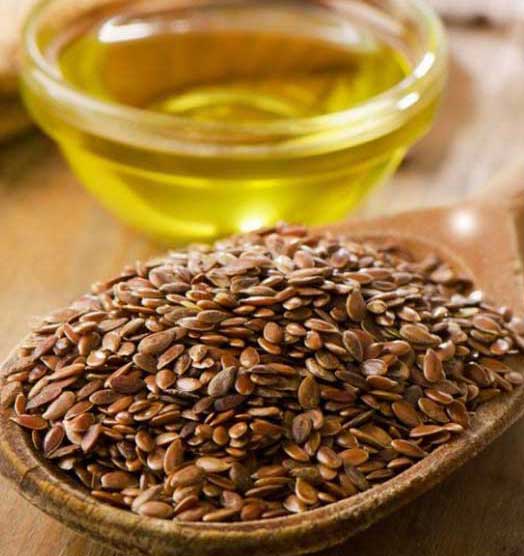
Did You Know?
Flaxseed oil is obtained from the seeds of flax plant. It is rich source of essential fatty acids (EFAs): linoleic acid (ω-6) and α-linolenic acid (ω-3), which regulate prostaglandins synthesis and hence induce wound healing process. It is low in saturated fatty acids (9 %), moderate in MUFAs (18 %), and rich in PUFAs (73 %).Of all lipids in flaxseed oil, α- linolenic acid is the major fatty acid ranging from 39.00 to 60.42 % followed by oleic, linoleic, palmitic and stearic acids, which provides an excellent ω-6:ω-3 fatty acid ratio of approximately 0.3:1.The health benefits of all ω-3 fatty acids (ALA) have been widely reported for several conditions including cardiovascular disease, hypertension, atherosclerosis, diabetes, cancer, arthritis, osteoporosis, autoimmune and neurological disorders.
Whats unique?
Flaxseed is the richest plant source of the ω-3 fatty acid i.e. α-linolenic acid (ALA). ALA can be metabolized in the body into DHA (ω-3) and EPA (ω-3).It provides greater bioavailability of ALA as compared to milled and whole seed.
Tales of the Past
Flaxseed oil was believed to bring mental and physical endurance by fighting fatigue and controlling aging process. According to Ayurveda, flaxseed has properties like balancing the skin pH, lubricous property, improving tensile strength or elasticity of the skin, improving moisture holding capacity of skin, removing skin blemishes, undernourishment and lack of luster/glow of the skin. Flax preparations were widely used in medicine as an enveloping and wound-healing agent in the treatment of gastrointestinal disorders. In the Middle ages, flaxseed oil was administered as a diuretic for the treatment of kidney disorders.
Application in Different Health Categories
Cardiovascular Health,Brain Health,Eye Health,Skin Health, Anti-Cancer,Kidney disorders,Liver Health, Gastrointestinal Health,etc.
Regulatory Status
FSSAI, FDA, Health Canada, EFSA approved
Different Dosage Formats
Capsules, Cooking oils, Gummies,Topical oils, Cosmetic products, etc
References
1.Ankit Goyal, Vivek Sharma, Neelam Upadhyay, Sandeep Gill, and Manvesh Sihag. Flax and flaxseed oil: an ancient medicine & modern functional food. J Food Sci Technol. 2014 Sep; 51(9): 1633–1653.
2.Marian S. Macsai. THE ROLE OF OMEGA-3 DIETARY SUPPLEMENTATION IN BLEPHARITIS AND MEIBOMIAN GLAND DYSFUNCTION. Trans Am Ophthalmol Soc 2008;106:336-356
3.Delfin Rodriguez-Leyva, Chantal MC Bassett, Richelle McCullough, and Grant N Pierce.The cardiovascular effects of flaxseed and its omega-3 fatty acid, alpha-linolenic acid. Can J Cardiol. 2010 Nov; 26(9): 489–496.